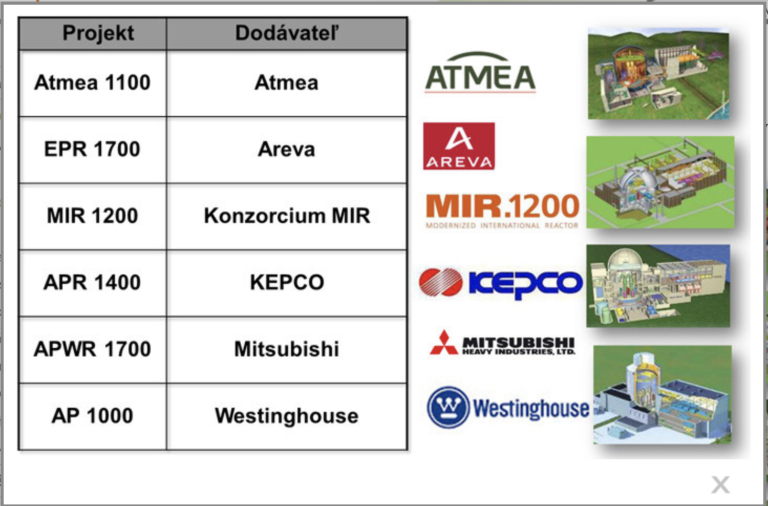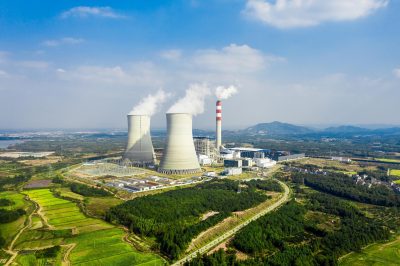The Institute of Nuclear Research Řež, a.s., has finished work on the Feasibility Study and background studies for the project of a new nuclear source (NJZ) in the Jaslovské Bohunice location. An internal document of several thousand pages forms the necessary basis for further decision-making on the preparation of the construction of a new nuclear power plant in Slovakia, said Štefan Šabík, CEO of the Nuclear Energy Company of Slovakia (JESS), at the International Conference Secure Energy Supply (SES) 2012.
As part of the Feasibility Study preparation process, the Jadrová energetická spoločnosť Slovenska approached 10 internationally recognized companies with experience in the preparation and construction of new nuclear sources with a focus on the technology of pressurized water, light water moderated and cooled reactors. The winner of the tender procedure, Ústav jaderného vízkušť Řež, a.s., started processing the key internal document in November 2011. The resulting Study contains analyzes and evaluations of the proposed technical alternatives, assessment of the suitability of the location, supply system, project management, financial security and economic analysis of the new nuclear source project.
As part of the Feasibility Study, 6 projects of pressurized water power plants were analyzed:

“The analyzes showed that all 6 projects have the potential to fulfill the basic assumptions of the new nuclear source project. However, it is necessary to add that this evaluation does not disqualify any other suppliers of pressurized water nuclear power plants from the future selection of the main supplier. ” specified Štefan Šabík.
The results of the study confirmed that for the construction project of a new nuclear source, provided that other conditions and recommendations resulting from the individual phases of the project are met, there are feasible variants of a single-block or two-block arrangement up to a total output of 2400 MWe.
The Feasibility Study also includes information from supporting studies, such as Study of the assessment of seismicity and geological conditions, Study of water management conditions, Study of related and induced investments, Study of the connection of a new nuclear source to the transmission system of the Slovak Republic, but also Study of the possibility of transporting oversized components.
As part of the assessment of seismicity and geological conditions, the so-called Preliminary report, according to which no facts have been found that would exclude or significantly complicate the implementation of the construction of the NJZ. A detailed examination of the seismic and geological conditions will be provided only in the Final Report, which will be finalized in 2013. The document will then be verified by the international inspection of the MAAE.
An important part of the Study is the assessment of several ways of securing the main supply of the NJZ project, nuclear fuel, as well as related and induced investments. A turnkey supply, including all supplies and services connected with construction and commissioning, was recommended as the most advantageous model for securing the main contract.
In connection with the economic security of the project, six variants were analyzed, assessed from the point of view of the investment evaluation. It includes not only the current net value of the project, the rate of return, but also other parameters such as total need for own capital, foreign resources, distribution of investments over time, etc.
As part of the project management process, a management model by one organizational unit created within the organizational structure of JESS was recommended. She should take responsibility for the entire project. Specialized engineering and consulting companies should provide support to JESS in carrying out activities such as project coordination, site survey, construction site input data collection, preparation of complete permit documentation, time planning, quality assurance, licensing and permit applications, technical supervision, supervision of project engineering, construction and subsequent commissioning. “We expect that at the beginning of construction we will need approximately 300 of our own employees and approximately 150 external workers from specialized companies. The total number of employees of the Jadrová energetická spoločnosť Slovenska, a.s. during operation should reach 650” confirmed Štefan Šabík. As he further added, due to the fact that it will mainly be highly qualified positions, it is inevitable to start the recruitment and training process well in advance.
The Feasibility Study also includes an analysis of the relevant legislation, the estimated time required for engineering works, input data from the information packages of individual potential suppliers and input data from other chapters of the study. Based on these analyses, scenarios were developed for the creation of time plans for the preparatory and preparatory stages of the project. Individual scenarios take into account the possibilities of financing the project, the supply system, ordering components with a long delivery time and block arrangement. If the key milestones of the project are met, according to the results of the Study, the launch of the first unit into trial operation after 2025 is realistic.
The feasibility study is currently the subject of further evaluation and analysis, the result of which will be the processing of JESS’s business plan and the determination of further procedures.
Jadrová energetická spoločnosť Slovenska, a.s.
Jadrová energetická spoločnosť Slovenska, a. s., was established on 31.12.2009 by registration in the Commercial Register of the Slovak Republic. The creation of a new project company was approved by the European Commission and subsequently by the Government of the Slovak Republic, which at its meeting on December 9, 2009 with its resolution no. 893/2009 approved the proposal to establish the commercial company JESS. Jadrová energetická spoločnosť Slovenska, a. s., is a joint venture of the Slovak Nuclear and Decommissioning Company, a. with. (JAVYS), which owns a 51% stake, and the Czech energy group CEZ, which owns 49% of the company’s shares.
The project partners are united by a common past. The Czech Republic and the Slovak Republic had a common energy system until 1993. Both countries jointly built nuclear power plants based on pressurized water reactors on their territories (Jaslovské Bohunice, Dukovany, Mochovce, Temelín), still have a similar composition of energy sources, legislative and regulatory environment, as well as ongoing business and personnel ties. The share capital of the company was set at EUR 216,357,000. According to the agreement of both partners, managerial control works on the principle of equality and consensus of both partners.
You can find more information at www.jess.sk

